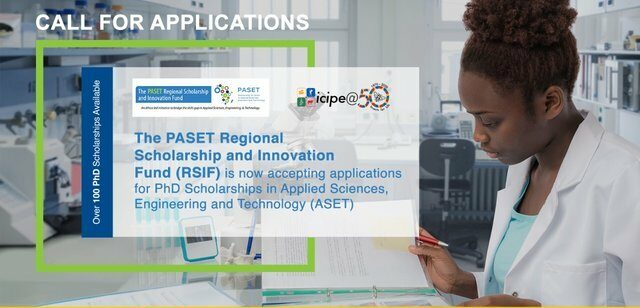Apply for the PASET Regional Scholarship and Innovation Fund (RSIF) PhD Scholarship 2021/2022.

Deadline
September 30, 2021
RSIF focuses on transformative technologies that have a far-reaching positive impact on society. It is funded by African governments, the European Commission, the World Bank and the Government of Korea and facilitated by the International Centre of Insect Physiology and Ecology (icipe) in Nairobi, Kenya.
RSIF aims to train quality PhD students and post-doctoral researchers at selected African universities to address the human resource gap of highly qualified specialists in the fields of applied sciences, engineering, and technology (ASET) and to contribute to improving research and innovation capacities in those fields in SSA.
Thematic Areas
RSIF supports training, research and innovation in five PASET Priority Thematic Areas:
- ICT including big data and artificial intelligence
- Food security and agri-business
- Minerals, mining and materials engineering
- Energy including renewables
- Climate change
Scholarship
- The RSIF PhD Scholarship covers university tuition and related fees, competitive stipend to cover living expenses, travel, medical insurance, and research costs.
- Graduates will have access to RSIF competitive research grants upon completion of their PhD.
Eligibility
To be eligible for a RSIF PhD Scholarship, applicants must:
- Have a relevant master’s degree in one of the fields of study.
- Meet the specific admission requirements of the RSIF African Host University where they would like to pursue a PhD.
- Be a citizen of a sub-Saharan Africa country.
- Preference will be given to applicants who are 35 years of age and below.
- Be willing to enroll full-time in a PhD program at an RSIF African Host University in the 2021-2022 academic year.
- Should not be holding another PhD scholarship, or currently be enrolled in any PhD Program when applying to the RSIF PhD scholarship.
- Be willing to spend 6-24 months in a ‘sandwich’ research placement at an international partner institute.
- Demonstrate that their research goals are well aligned to the Priority Thematic Areas and contribute to Africa’s development.
Application
Applications are accepted through the online application platform. Applications submitted by email or in hardcopy will not be accepted.
Be the first to comment